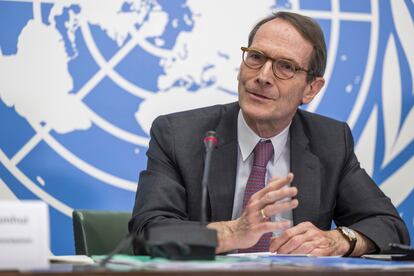UN-backed inquiry accuses Russia of war crimes in Ukraine
Among potential crimes against humanity, the report cited attacks on Ukrainian infrastructure that left hundreds of thousands without heat and electricity during the coldest months

Russian attacks against civilians in Ukraine, including systematic torture and killing in occupied regions, amount to war crimes and possibly crimes against humanity, according to a report from a U.N.-backed inquiry released Thursday.
The sweeping human rights report, released a year to the day after a Russian airstrike on a theater in Mariupol killed hundreds sheltering inside, marked a highly unusual condemnation of a member of the U.N. Security Council.
Among potential crimes against humanity, the report cited repeated attacks targeting Ukrainian infrastructure since the fall that left hundreds of thousands without heat and electricity during the coldest months, as well as the “systematic and widespread” use of torture across multiple regions under Russian occupation.
“There were elements of planning and availability of resources which indicate that the Russian authorities may have committed torture as crimes against humanity,” said Erik Møse, a former Norwegian Supreme Court and European Court of Human Rights judge who led the investigation.
The investigation also found crimes committed against Ukrainians on Russian territory, including deported Ukrainian children who were prevented from reuniting with their families, a “filtration” system aimed at singling out Ukrainians for detention, and torture and inhumane detention conditions.
A commission of inquiry is the most powerful tool used by the U.N.-backed Human Rights Council to scrutinize abuses and violations around the world. The investigation released Thursday was set up during an urgent debate shortly after Russia’s invasion last year.
The commission’s three members are independent human rights experts, and its staff gets support and funding from the council and the U.N. human rights office.
The report’s authors noted a “small number” of apparent violations by Ukrainian forces, including one they said was under criminal investigation by Ukrainian authorities, but reserved the vast majority of their report for allegations against Russia.
Russia did not respond to the inquiry’s appeals for information.
Most of the abuses highlighted by the investigation were already well known, and the report is far from the first to accuse Russia of war crimes. However, the inquiry’s findings come with the imprimatur of the international community: The experts work under a mandate overwhelmingly created last year by the Human Rights Council, which brings together the governments of 47 U.N. member countries.
Møse, who served as president of an international tribunal established to prosecute genocide cases from the massacre of members of Rwanda’s ethnic Tutsi minority in 1994, said investigators have created a list of individuals to hold accountable for human rights violations in Ukraine.
He said the list would be “submitted to the relevant authorities in this issue,” but the team acknowledged the difficulty of investigations involving a permanent member of the U.N. Security Council.
Ultimately, the report may add to efforts to boost accountability for crimes committed in the war — whether by the International Criminal Court or by some individual countries that have taken on the right to apply “universal jurisdiction” to prosecute atrocities, wherever they may take place.
Sign up for our weekly newsletter to get more English-language news coverage from EL PAÍS USA Edition
Tu suscripción se está usando en otro dispositivo
¿Quieres añadir otro usuario a tu suscripción?
Si continúas leyendo en este dispositivo, no se podrá leer en el otro.
FlechaTu suscripción se está usando en otro dispositivo y solo puedes acceder a EL PAÍS desde un dispositivo a la vez.
Si quieres compartir tu cuenta, cambia tu suscripción a la modalidad Premium, así podrás añadir otro usuario. Cada uno accederá con su propia cuenta de email, lo que os permitirá personalizar vuestra experiencia en EL PAÍS.
¿Tienes una suscripción de empresa? Accede aquí para contratar más cuentas.
En el caso de no saber quién está usando tu cuenta, te recomendamos cambiar tu contraseña aquí.
Si decides continuar compartiendo tu cuenta, este mensaje se mostrará en tu dispositivo y en el de la otra persona que está usando tu cuenta de forma indefinida, afectando a tu experiencia de lectura. Puedes consultar aquí los términos y condiciones de la suscripción digital.








































